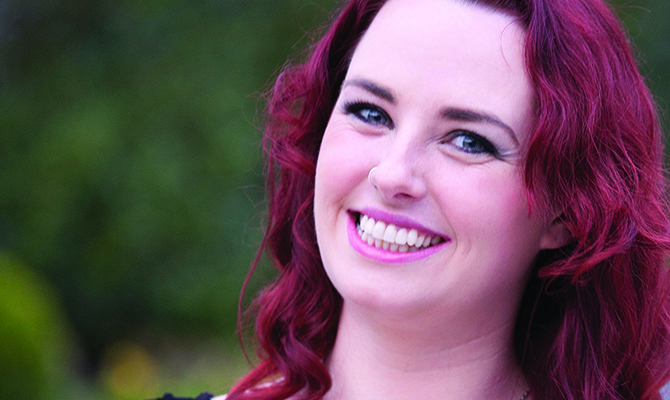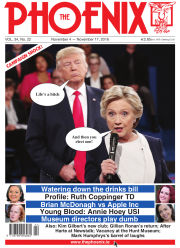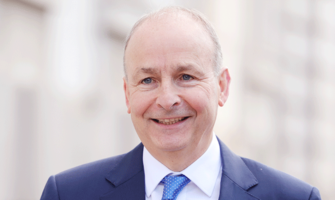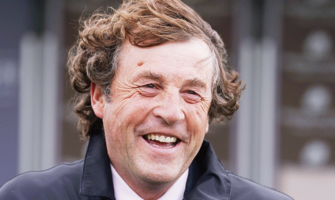
Annie-Hoey
Annie Hoey (28) made headlines last month when, as president of the Union of Students in Ireland (USI), she led a 15,000 strong march in Dublin against fees. After several quiet years, the student movement is back out on the streets, campaigning for increased investment in education and against the possible introduction of a third-level loan system. So is Hoey making the USI a viable activist organisation again or is she, like the leadership of USI in recent years, tied to the strings of the Labour Party?
Originally from Drogheda, Hoey upped sticks in 2006 to take a degree in theatre studies at University College Cork. She stayed there for eight years, completing her undergraduate degree as well as a master’s in comparative literature and a postgraduate certificate in women’s studies along the way. Hoey became a liberal icon and a popular figure on the Cork campus, being voted college society person of the year in 2013 for her work with Amnesty, as chairperson of the LGBT Society and her co-founding of a humanist society in Cork. She secured office in the same year as the UCC SU campaigns officer and deputy president, but since then, Hoey has never had to win an election. She was unopposed when she ran for USI vice president for equality and citizenship in 2014, a role in which she worked closely with then-president, Labour’s Laura Harmon. Hoey was also unopposed in 2015 when she ran again for the same position, after which USI president and Labour Youth activist Kevin Donoghue appointed her his deputy president. In a stroke of fortune, Hoey was even unopposed when she ran for USI president earlier this year, winning 181 votes out of 207 at USI congress; the other 26 votes were cast in favour of reopening the nominations.
After her election in March, Hoey inherited a union that had lost much of its activist credentials on bread and butter student issues, partly because of the influence the Labour Party exerted over it in recent times. Under the card-carrying Harmon, now party women and equality officer, USI even brought former Labour press officer Pat Montague’s communications company on board to media train the would-be politicos. Hoey says this commercial relationship with Montague Communications has ended but she’s still friendly with him. As a result of Labour’s influence at the top of the union, it fixed its attention on social campaigns, such as marriage equality, effectively allowing successive USI presidents to circumvent tough questions around higher education access and funding. To her credit, marriage equality and LGBT rights were deeply held concerns for Harmon, but she focused on these to the detriment of others (see The Phoenix 08/05/15). That also allowed her to avoid dealing, in any real sense, with her own Labour Party’s austerity policies and their impact on education. Harmon’s USI half-heartedly organised an education march, an abortive exercise that brought a meagre 5,000 students onto the streets, compared to 15,000 under Hoey. Donoghue’s USI didn’t even bother with the formality of a march, politely opting for a voter registration drive and saving the coalition government any embarrassment in the run-up to this year’s election. So why then has Hoey, whose own politics originates in the soft, social liberalism of her predecessors, worked to bring USI back onto the streets?
The last 18 months has seen a pronounced shift in Irish student politics to which Hoey has had to react. Students Against Fees, an influential grassroots organisation with its origins in Trinity College, has helped shift the gaze of campus politicians back toward the economics of education. That organisation has spread from Trinity and put pressure on student union officers to resist fee increases proposed by the Cassells Report earlier this year. Another jolt was the 2015 election of Tallaght firebrand Lynn Ruane as SU president in Trinity. Ruane had a radical sheen and was much stronger than USI during the austerity years on funding, fees and access to third-level education (see The Phoenix 26/08/16). Her popularity and national profile have proved to a younger generation of more idealistic students that it’s possible to win power within the union structures. USI even had to make the unprecedented move of openly endorsing Ruane in her successful bid for a Seanad seat as an independent in April this year.
Hoey has been forced to engage with this new dispensation, pivoting her natural politics to reflect the revived anger over funding. Labour’s near total wipe-out in the February election has also made it a lot easier for Hoey to criticise government policy on the issue than it was for the obsequious Harmon when her party was in power. Toward the end of Donoghue’s tenure in June, just as Labour was adjusting to life in opposition, USI announced a coalition with several major trade unions – ones with strong links to the Labour Party – to campaign for third-level investment. Those familiar with the alliance say Hoey has shown herself far more open to union collaboration than either of her predecessors and this co-operation undoubtedly had a positive impact on numbers for her October march.
Although she told Goldhawk she hasn’t committed to any party, Hoey is close to both predecessors socially and politically and it looks likely her future is in Labour. Labour’s Ged Nash even publicly supported his “fellow Droghedean” on Twitter when she was running for USI president earlier this year, describing her, gushingly, as a “fine human being”. Those who know her say Hoey has expressed Seanad ambitions and it seems likely she will follow in Harmon’s footsteps and take a tilt at a seat in the upper house, possibly as a Labour independent, like Ivana Bacik. For her part, Hoey says she’s definitely interested in running for public office but not in the near future.
If she does officially enter the Labour ranks, she might be joining a sinking ship. In the polls, the party is careening down a seemingly endless drain under leader Brendan Howlin, as they find themselves defending a record to the right of even Fianna Fáil. Without any strong political identity, Labour is having to retreat to weak-tea liberalism of the Ruairí Quinn variety, trying to win back young voters by cashing in on its historic support for gay rights and abortion legislation.
Although perhaps not the operator her predecessors were, Hoey is an energetic campaigner and an ambitious politician who speaks well on her pet issues. She could have a prominent role to play in Labour’s next generation, if that party survives the current one.


















